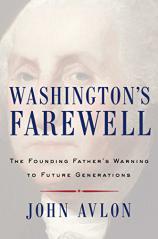Washington's Farewell: The Founding Father’s Warning to Future Generations
Review
Washington's Farewell: The Founding Father’s Warning to Future Generations
At the start of what's likely to be one of the most controversial, if not divisive, presidencies in our history, it's informative, and perhaps reassuring, to spend some time reflecting on the first presidential administration. In his thoroughly researched and intelligent work of popular history, WASHINGTON'S FAREWELL, Daily Beast Editor-in-Chief and CNN political analyst John Avlon has performed a valuable service by encouraging a renewed focus on one of America's foundational documents, George Washington’s Farewell Address.
A former speechwriter for Rudy Giuliani, Avlon nonetheless classifies himself as a political independent and doesn't bring any obvious ideological agenda to this work. Perhaps it's that orientation that makes him an unabashed admirer of Washington, a strong, selfless leader he credits for helping to preserve the fragile American union in its infancy through "sheer force of will and a gritty commitment to the principle of moderation."
Avlon devotes his attention to three broad subjects: the early days of the American republic and the persistent threats to its survival during the eight years of Washington's presidency; the content of the Farewell Address itself; and, finally, what he calls the "afterlife of the idea" --- the ways in which the document has been reinterpreted, and at times misinterpreted, by succeeding generations.
As Avlon describes it, Washington's message wasn't rooted in abstract political philosophy musings, but instead in the real life public service of this eminently practical, self-educated gentleman farmer and citizen-soldier. By the end of his first term, Washington, a moderate by both temperament and philosophy, had become, in Avlon's description, "deeply frustrated by the rise of partisanship," that was "fueled by duplicity bordering on treason and enslaved by the rise of a partisan press that infuriated him with its unaccountable and often manic attacks on his character."
"John Avlon has performed a valuable service by encouraging a renewed focus on one of America's foundational documents, George Washington’s Farewell Address.... If we expect to endure and prosper, WASHINGTON’S FAREWELL reminds us that today's leaders, for all their flaws, will have to be no less gifted."
Chief among those partisans were former ambassador to France Thomas Jefferson and once loyal Washington aide James Madison (drafter of an earlier version of the Farewell Address in June 1792, when Washington contemplated departing public life at the end of his first term), who collaborated in the formation of the Democratic-Republican Party. Among its guiding principles was virulent opposition to Washington ally Alexander Hamilton's push for a strong central government.
Those political travails contributed to two of the six "pillars" that comprised the speech --- the importance of national unity and political moderation --- along with fiscal discipline, public virtue and religious pluralism, the centrality of education (including the need for a national university), and a foreign policy that preserved American neutrality, ensured by a strong national defense. Avlon devotes a workmanlike chapter to each one, describing how Washington "tried to reveal his character and the character of our nation at the same time," as his "overriding focus was turning the fact of independence into enduring liberty."
In the final section of his book, Avlon embarks on a rapid journey through the 220 years of American history that have ensued since Washington shared his ideas, exploring how, in several critical instances, they've have been tested and their wisdom revealed, if sometimes tempered by changed circumstances. There's some irony, for example, in the fact that one of the first such major challenges came in the form of the Civil War, when the slave-owning Washington's fellow Virginians abandoned what Avlon calls the "core message of his public life," the "necessity of national union in the face of factions and regional rivalries."
Perhaps the most profound contest over the legacy of the address, Avlon explains, lay in the debate surrounding America's evolving role in an increasingly interconnected world of the 20th century, one that manifested itself in Woodrow Wilson's failed campaign to bring the country into the League of Nations and Franklin Delano Roosevelt's successful effort to enlist it in the fight against Nazi Germany.
While it was relatively simple for Washington, presiding over a country isolated from foreign powers by two vast oceans, to urge abstention from foreign quarrels in the Farewell Address (without the reference to avoiding "entangling alliances" that's often erroneously attributed to it), that neutrality became more problematic as technology made the world a much smaller place. Still, Avlon suggests, our involvement in wars like Vietnam, Iraq and Afghanistan reveals the enduring wisdom of Washington's advice.
WASHINGTON'S FAREWELL also provides some entertaining fodder for trivia buffs. Despite its name, Washington never publicly delivered the 6,088-word "address" (though it's read in the Senate each year on his birthday). Instead, the document (which began with Washington's announcement of his precedent-setting decision to foreswear a third term) was published in the September 19, 1796 edition of Claypoole's American Daily Advertiser, in Philadelphia, a paper he perceived as free of partisan taint. Although the ideas it contains indisputably were Washington's own, the principal drafter was Alexander Hamilton, a fact that did not escape the attention of Lin Manuel Miranda in his hit musical, whose duet between Washington and Hamilton, "One Last Time," contains some of the document's text.
Washington's "disinterested warnings of a parting friend" need to be studied anew, in Avlon's view, because their "durable wisdom is starkly relevant and due for resurgence." Part of America's great good fortune is the fact that a leader as wise and prudent as George Washington came first. If we expect to endure and prosper, WASHINGTON’S FAREWELL reminds us that today's leaders, for all their flaws, will have to be no less gifted.
Reviewed by Harvey Freedenberg on February 3, 2017
Washington's Farewell: The Founding Father’s Warning to Future Generations
- Publication Date: January 10, 2017
- Genres: History, Nonfiction
- Hardcover: 320 pages
- Publisher: Simon & Schuster
- ISBN-10: 147674646X
- ISBN-13: 9781476746463





